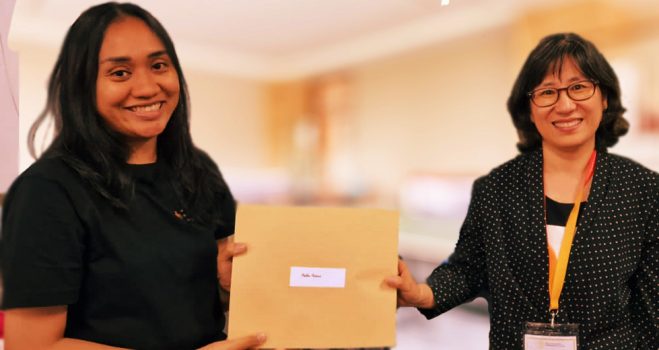Pauline Patricia stands at the heart of a transformative wave within Indonesia’s Protestant Church in Western Indonesia (GPIB), embodying a rare blend of resilience and a deep-seated commitment to theological reform. As a vicar and an alumna of Jakarta Theological Seminary (JTS) with degrees in Homiletics, Pauline’s path has been marked by a relentless drive to reshape the way faith interacts with a rapidly changing world. Her recent experience at the World Communion of Reformed Churches’ (WCRC) Global Institute of Theology (GIT) in Suva, Fiji, where she was one of the few selected to attend after a three-year wait due to the pandemic, has only strengthened her conviction. To her, the GIT program has become “a home for theologians to continuously reform themselves”—a community where challenging theological norms is both encouraged and necessary.
Reflecting on what initially drew her to GIT, Pauline recalls the program’s 2020 theme, “Unsettling the Word in an Unsettled World,” as a deep influence. Her keen interest in preaching made this theme feel like a calling. Not only was it timely in a world gripped by a pandemic, but it resonated with her sense of purpose: to address the Word of God amid the turmoil of the human experience. Preaching, she explains, is filled with both “euangelion”—or good news—and the painful acknowledgment that, in times of crisis, words sometimes fall short. This tension in preaching becomes a space for God’s grace, she notes, but it also reveals moments when God may seem silent, showing what she calls a “cracked” dimension of homiletics, where the Word is both essential and inadequate. With this insight, Pauline arrived at GIT ready to engage with new ideas and discover how to “unsettle” and renew the Word in ways that might better resonate with her ministry.
Pauline’s time at GIT was filled with opportunities to expand her theological insights. Under the guidance of prominent lecturers—such as Hye Ran Kim-Cragg, Revelation Velunta, and Philip Peacock—Pauline’s thinking became more critically attuned to the Reformed perspective. Her understanding of contextual theology took on a new dimension through unique experiences in Fiji. There, she witnessed the Eucharist celebrated with coconut in place of bread and wine, a powerful, embodied lesson in the integration of local culture with worship. She had first encountered this practice in her theological studies at JTS, but experiencing it firsthand reshaped her understanding of how liturgy can both honor tradition and adapt meaningfully to local contexts.
Another pivotal experience for her was the “preaching clinic,” where each participant preached and received feedback from peers and lecturers. This part of the program, she recalls, was transformative. The feedback allowed her to refine her own approach to homiletics and see preaching as a dialogue—a bridge of both vulnerability and strength. These sessions taught her the ways in which a sermon can become an opening to God’s grace while also holding space for silence and questioning.
Returning home with these insights, Pauline encountered a new challenge as she continued her role as a vicar in a large city congregation in Indonesia. Her GIT training had given her a sense of responsibility to introduce the “disruptive” and reformative ideas she had learned. But bridging this gap between knowledge and practice in her settled, comfortable congregation has required a careful balance of respect for established customs and a courage to ask the hard questions. For Pauline, this tension is a call to remain an agent of transformation. Her time at GIT, she feels, has equipped her with both the confidence and the tools necessary to start this dialogue and pursue meaningful changes in her congregation.
One of her most powerful memories from GIT came in the form of a morning worship service she helped prepare with the other participants. The service included a song in sign language—a move intended not only as an act of inclusion but also as a challenge to rethink the accessibility of worship. Using sign language, Pauline explained, was a way of acknowledging the unique challenges of the deaf community and disrupting the usual flow of worship for the hearing participants. Her goal was to raise awareness about the importance of accessibility in ministry and to invite others into a space of empathy for marginalized groups. It was an unforgettable experience that reinforced her desire to advocate for inclusivity within her own ministry.
For those considering the GIT program, Pauline has a straightforward message: “Be a theologian who is unsettled and unsettling.” She encourages future participants to see GIT as a space to deepen their commitment to justice and transformation. The program, she says, is an unparalleled opportunity to challenge norms and build relationships with people from around the world, strengthening both one’s theology and sense of empathy for social and ecological issues.
Ultimately, GIT was more than an academic experience for Pauline—it was a spiritual homecoming. As she continues her ministry, Pauline carries forward the invaluable insights from GIT: an embrace of critical thought, a renewed sense of community, and a fresh commitment to reformational theology. Her journey reflects not only the spirit of the Reformed tradition but also an unyielding dedication to unsettling the norms in pursuit of a more inclusive, empathetic ministry.


